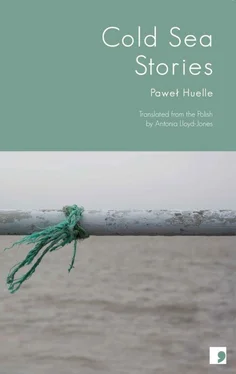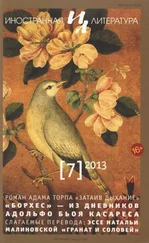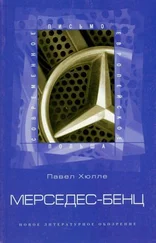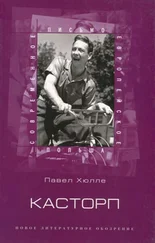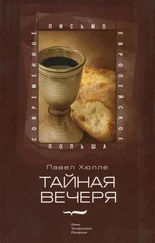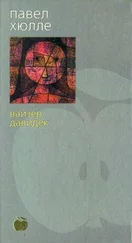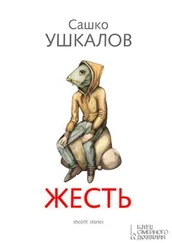Bishop Sedenza is a real historical character, and the story of his captivity is recorded in the mediaeval chronicles. Of course there really were pirates on these waters too. The Hel peninsula is the long spit of land that sticks out into the Bay of Gdańsk, a place where ships were often wrecked on the sandbanks. And it’s also true that I was sent to the fishing village of Hel to buy fish for Christmas (the Polish traditional meal is carp, or at least fish of some kind). There was often nothing to buy in the shops, so you had to go and get it from the fishermen.
ALJ: ‘Öland’ is an unusual story for you, because although it is set on the Baltic, it happens on an island off the Swedish coast, not anywhere in northern Poland.
PH: I spent three weeks on the island of Öland, and I found the landscape mystical. At the very centre of the island you can hear the roar of the sea coming from every direction. It’s quite empty, with no people, and there are some mysterious stone circles, tall grass, and the wind. But no woods or trees. There I listened to the wind, the grass and the sea roaring – there were no other sounds. I wanted to write a story connected to an apocryphal legend about the Three Kings, which says that after their journey to Bethlehem two of them went home peacefully, but the third one wandered for centuries, unable to find his way back.
ALJ: ‘Doctor Cheng’ seems the most mystical story of all – why the Chinese theme, and why did you feature the 9/11 tragedy here?
PH: The 9/11 disaster stands as a caesura that divides our era in two. Meanwhile, the hero is searching for the ghost of his dead wife, whose death marks the division in his life.
The Chinese house in the Wrzeszcz district of Gdańsk is based on a real house, on Szymanowski Street, built in the Secession era and stylised to look Chinese. The I-Ching , the Chinese fortune-telling book, is seen by some to have a bad influence on Chinese culture, as the prophecies it contains are considered fatalistic. The book the man remembers receiving as a Christmas present in childhood is the Polish classic children’s novel, Mr Inkblot’s Academy by Jan Brzechwa, in which one of the characters is a magical Chinese doctor called Pai Chi Wo.
ALJ: ‘The Fifteen Glasses of Gendarme Polanke’ has a different atmosphere from the other stories, is set in the early twentieth-century and is the only story not to feature a large and important book, be it a Bible or a toyshop catalogue. Why is it so different?
PH: I originally wrote it twenty years ago as the start of a novel about Kashubia, which I never finished. As a child I was taken on holiday to a Kashubian village, where there was no electricity – it was like in the nineteenth century, people still used oil lamps and candles, and were self-sufficient, making their own bread, butter and sausages. They went to the city by horse for three things only – salt, oil for their lamps, and nails. They made everything else themselves. There was no radio, and no TV, and in the evenings people drank weak beer and told incredible stories for hours on end. It was wonderful for me as a child, I have a mythical memory of it, and I still dream about it. Kashubia has changed now, but the people there still speak their own language, Kashubian – I have a passive knowledge of it.
I might still write that novel one day, so I won’t say what it is about, but the woman who is rescued has a very big secret. Polaske is the universal policeman who represents all historical regimes in this part of the world. In this story he is a Kashubian policeman before Polish independence, before 1918. Then in the inter-war period, when Poland was a republic again, he becomes Polański, a Polish policeman. During the Second World War and the Nazi occupation he is Polaske, a German, Nazi policeman. Then after the war, in communist People’s Poland he is called Polski, and he’s a Polish communist policeman.
ALJ: Where did the idea for ‘Abulafia’ come from, apart from reflecting your interest in the history of the region surrounding Gdańsk?
PH: It’s odd, but I don’t really know why I wrote it – it just came into my mind one day, as a combination of various themes. The Junkers were the Pomeranian, German gentry, and von Kotwitz would have been a typical surname for a Junker. I used the same name for a character in my novel Castorp , set in the same era. ‘Abulafia’ is about how a person goes to the very edge of existence, in search of something that is ill-defined: the utopian dream of the language of the Garden of Eden, spoken by all mankind before the Tower of Babel.
ALJ: What gave you the idea for ‘The Flight into Egypt’? Why did you choose to write about refugees from Chechnya?
PH: A few years after the first war in Chechnya (which happened in the mid-1990s) I saw a photograph of a beautiful Chechen woman, taken on the border between Poland and Russia, and I found it very moving. She looked like the Virgin Mary in an icon; she had a look of great suffering but also of pride. It was in all the main daily papers. She must have been very young, nineteen or twenty, and she was waiting to be let into Poland as a refugee. It made an impression on me, and triggered the idea for this story. I talked to some Poles who were working with Chechens and knew about the refugee camps, so that aspect of the story is true – it is based on the real fate of the Chechens, who have suffered a genocide, all the worse for the fact that the world has turned a blind eye to it.
ALJ: ‘Franz Carl Weber’ seems to combine realism with fantasy – which elements are taken from life and which are pure invention?
PH: It is to some extent autobiographical, in that my father really did bring a Swiss railway set home for me and my brother from abroad. For children growing up in austere, communist Poland, it was like having our own helicopter, or a flying carpet – a beautiful gift like a memory of a world that no longer existed. In the mid-1990s I went to Zurich for a literary event, and I found the toy shop, Franz Carl Weber, which is still there. I went inside and saw all the toys in the world, except for electric railways, because things have changed now.
ALJ: I know Lake Ukiel is a real place, about 130 kilometres south east from Gdańsk, in the Mazurian lakelands. But it seems a strange name for a Polish lake.
PH: Yes, it is near Olsztyń, and still appears on the maps with its Polish name, Lake Krzywe (‘krzywe’ means ‘crooked’), as well as the name Lake Ukiel – meaning ‘elbow’ in the language of the original natives of this region, the Old Prussians, or Baltic Prussians, who were wiped out by the Crusaders and disappeared as a race. They were northern Europe’s equivalent of the North American Indians, and all that is left of them are a few place names. They feature quite strongly in early Polish history. In 997 Poland’s patron saint, St Wojciech, was sent by King Bolesław I to convert the Old Prussians, who killed and (according to one version) ate him.
ALJ: You return to some of the themes of ‘Mimesis’ in ‘First Summer’, where the Bible found by the main character is clearly meant to be the one hidden by Harmensoon, the Mennonite preacher in ‘Mimesis’. What was your thinking here?
PH: I wrote ‘Mimesis’ much earlier than the other stories, and ‘First Summer’ last of all, so together the two stories have a circular structure. When the hero of ‘First Summer’ finds the Bible, he closes a circle that began in ‘Mimesis’. That book can never be as important to today’s modern civilisation as it was in the past. Once it was what mattered most to earlier generations, but things have changed, and it no longer has the same significance.
Читать дальше
